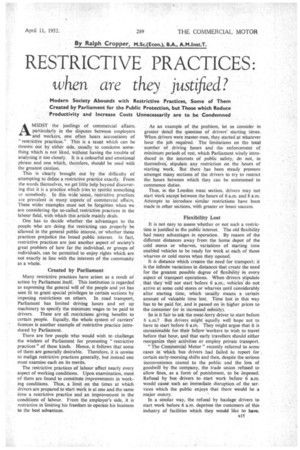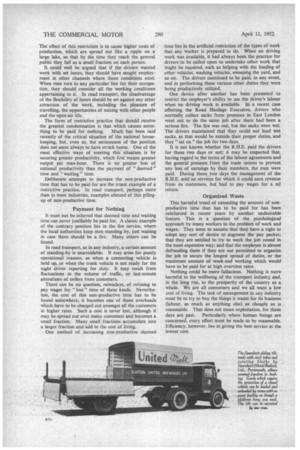RESTRICTIVE PRACTICES: when are they justified?
Page 49

Page 50

If you've noticed an error in this article please click here to report it so we can fix it.
Modern Society Abounds with Restrictive Practices, Some of Them Created by Parliament for the Public Protection, but Those which Reduce Productivity and Increase Costs Unnecessarily are to be Condemned
By Ralph Cropper, M.Sc.(Econ.), B.A., A.M.Inst.T.
AMIDST the jostlings of commercial affairs, particularly in the disputes between employers and workers; one often hears accusations of "restrictive practices." This is a taunt which can be thrown out by either side, usually to condemn something which is not liked, without having the trouble of analysing it too closely. It is a colourful and emotional phrase_ and one which, therefore, should be used with the greatest caution.
This is clearly brought out by the difficulty of attempting to define a restrictive practice exactly. From the words themselves, we get little help beyond discovering that it is a practice which tries to restrict something or somebody. In this wide sense, restrictive practices are prevalent in many aspects of commercial affairs. These wider examples must not be forgotten when we are considering the so-called restrictive practices in the labour field, with which this article mainly deals.
One has to decide whether the advantages to the people who are doing the restricting can properly be allowed in the general public interest, or whetherthose practices prejudice the broad public interest. In fact, restrictive practices are just another aspect of society's great problem of how far the individual, or groups of individuals, can be permitted to enjoy rights which are not exactly in line with the interests of the community, as a whole.
Created by Parliament Many restrictive practices have arisen as a result of action by Parliament itself. This institution is regarded' as expressing the general will of the people and yet has seen fit to grant special privileges to certain sections by imposing restrictions on others. In road transport, Parliament has limited driving hours and set up machinery to specify the. minimum wages to be paid to drivers. These are all restrictions giving benefits to . certain people. Equally, the whole system of carriers' licences is another example of restrictive practice introduced by Parliament.
There are few people who would wish to challenge the wisdom of Parliament for promoting "restrictive practices" of these kinds. Hence, it follows that some of them are generally desirable. Therefore, it is unwise to malign restrictive practices generally, but instead one must examine each on its merits.
The restrictive practices of labour affect nearly every aspect of working conditions. Upon examination, most of them are found to constitute improvements in working conditions. Thus, a limit on the times at which drivers are prepared to start work is at one and the same time a restrictive practice and an improvement in the conditions of labour. From the employer's side, it is restrictive in limiting his freedom to operate his business to the best advantage. As an example of the problem, let us consider in greater detail the question of drivers' starting times. When _drivers were -master-men, they started at whatever hour the job required. The limitations on the total number of driving hours and the enforcement of minimum periods of rest, which Parliament wisely introduced in the interests of public safety, do not, in themselves, stipulate any restriction on the hours of starting work. But there has been steady pressure amongst many sections of the drivers to try to restrict the hours between which they can be summoned to commence duties.
Thus, in the London meat section, drivers may not start work except between the hours of 6 a.m. and 8 a.m. Attempts to introduce similar restrictions have been made in other sections, with greater or lesser success.
Flexibility Lost It is not easy to assess whether or not such a restriction is justified in the public interest. The old flexibility had many advantages in operation. By reason of the different distances away from the home depot of the cold stores or wharves, variations of starting time enabled vehicles to be ready for work at each of those wharves or cold stores when they opened.
It is distance which creates the need for transport; it is the infinite variationsin distances that create the need for the greatest possible degree of flexibility in every aspect of transport operations. When drivers stipulate that they Will not start before 6 a.m., vehicles do not arrive at some cold stores or wharves until considerably after starting time, which usually means a certain amount of valuable time lost.. Time lost in this way has to be paid for, and is passed on in higher prices to the Consumer (or in increased subsidy); So is it fair to ask the meat-lorry driver to start before 6 a.m.? Bus drivers might equally well hope not to have to start before 6 a.m. They might argue that it is unreasonable for their fellow ivorkers to wish to travel before that hour, and that early travellers should either reorganize their activities or employ private transport.
"The Commercial Motor" recently referred to some cases in which bus drivers had failed to report for . certain early-morning shifts and then, despite the serious inconvenience caused to the public and the loss of goodwill by the company, the trade union refused to allow fines, as a form of punishment, to be imposed. Refusal by bus drivers to start work before 6 a.m. would cause such an immediate disruption of the services which the public enjoys that there would be a major outcry.
In a similar way, the refusal by haulage drivers to start work before 6 a.m. deprives the customers of this industry of facilities which they would like to have.
The effect of this restriction is to cause higher costs of production, which are spread out like a ripple on a large lake, so that by the time they reach the general public they fall as a small fraction on each person.
It could well be argued that if the drivers wanted work with set hours, they should have sought employment in other channels where those conditions exist. When men turn to any particular line for their occupation, they should consider all the working conditions appertaining to it. In road transport, the disadvantage of the flexibility of hours should be set against any other attraction of the work, including the pleasure of travelling, the opportunities of mixing with other people and the open-air life.
The form of restrictive practice that should receive the greatest condemnation is that which causes something to be paid for nothing. Much has been said recently of the critical situation of the national housekeeping, but, even so, the seriousness of the position does not seem always to have struck home. One of the most effective ways of meeting this situation is by securing greater productivity, which first means greater output per man-hour. There is no greater loss of national productivity than the payment of " deemed " Lime and " waiting " time.
Deliberate attempts to increase the non-productive time that has to be paid for are the truest example of a restrictive practice. In road transport, perhaps more than in most industries, examples abound of this pilingup of non-productive time.
Payment for Nothing It must not be inferred that deemed time and waiting time can never justifiably be paid for. A classic example of the contrary position lies in the fire service, where the local authorities keep men standing by, just waiting in case there should be a fire. Many others can be found.
In road transport, as in any industry, a certain amount of standing-by is unavoidable. It may arise for purely operational reasons, as when a connecting vehicle is held up, or when the trunk vehicle is not ready for the night driver reporting for duty. It may result from fluctuations in the volume of traffic, or last-minute alterations of orders from customers.
There can be no question, nowadays, of refusing to pay wages for " lost " time of these kinds. Nevertheless, the cost of this non-productive time has to be found somewhere; it becomes one of those overheads which have to be charged out amongst all the customers in higher rates. Such a cost is never lost, although it may be spread out over many customers and becomes a small fraction. Many small fractions accumulate into a larger fraction and add to the cost of living.
One method of increasing non-productive deemed time lies in the artificial restriction of the types of work that any worker is prepared to do. When no driving work was available, it had always been the practice for drivers to be called upon to undertake other work that might be required, such as helping with the loading of other vehicles, washing vehicles, sweeping the yard, and so on. The drivers continued to be paid, in any event, and in performing these various other duties they were being productively utilized.
One device after another has been presented to restrict the employer's ability to use the driver's labour when no driving work is available. In a recent case affecting the Road Haulage Executive, drivers who normally collect sacks from premises in East London went out to do the same job after there had been a serious fire. The fire was out, but the sacks were wet. The drivers maintained that they could not load wet sacks, as that would be outside their proper duties, and they "sat on "the job for two days.
It is not known whether the R.H.E. paid the drivers for those two days or not; it may be suspected that, having regard to the terms of the labour agreements and the general pressure from the trade unions to prevent any loss of earnings by their members, the men were paid. During those two days the management of the R.H.E. sold no services for which it could earn revenue from its customers, but had to pay wages for a nil return.
Organized Waste
This harmful trend of extending the amount of nonproductive time that has to be paid for has been reinforced in recent years by another undesirable feature. This is a question of the psychological approach by many workers to the problem of' work and wages. They seem to assume that they have a right to adopt any sort of device to augment the pay packet; that they are entitled to try to work the job round in the most expensive way; and that the employer is almost defrauding them if they are not permitted to organize the job to secure the longest spread of duties, or the maximum amount of week-end working which would have to be paid for at high overtime rates.
Nothing could be more fallacious. Nothing is more harmful, to the wellbeing of the transport industry and, in the long run, to the prosperity of the country as a whole. We are all consumers and we all want a low cost of living. The task of management in any industry must be to try to buy the things it wants for its business (labour, as much as anything else) as cheaply as is reasonable. That does not mean exploitation, for those days are past. Particularly where human beings are concerned, every effort must be made to be reasonable. Efficiency, however, lies in giving the best service at the lowest cost.




















































































